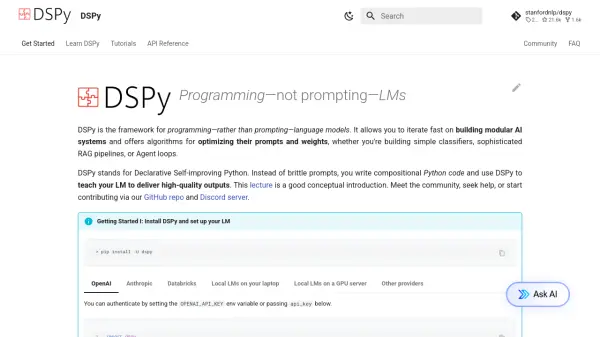What is DSPy?
DSPy (Declarative Self-improving Python) is a sophisticated framework designed to transform how developers interact with language models. Rather than relying on traditional prompting methods, it enables developers to write compositional Python code that can be automatically optimized for high-quality outputs.
The framework provides a comprehensive ecosystem of tools including modules for describing AI behavior, optimizers for tuning prompts and weights, and a rich set of components for building complex AI systems. It supports multiple language model providers and offers features like automatic caching, structured outputs, and sophisticated evaluation metrics for measuring system performance.
Features
- Modular Programming: Write AI behavior as code instead of prompts
- Automated Optimization: Built-in algorithms for tuning prompts and weights
- Multiple LM Support: Compatible with various language model providers
- Structured Signatures: Define input/output behavior with typed signatures
- Composable Modules: Build complex AI systems from simple components
- Evaluation Tools: Built-in metrics and evaluation frameworks
- Automatic Caching: Efficient handling of LM calls
Use Cases
- Building classification systems
- Implementing RAG pipelines
- Creating AI agents and chatbots
- Developing multi-stage AI workflows
- Information extraction systems
- Mathematical reasoning applications
FAQs
-
What language models does DSPy support?
DSPy supports multiple LM providers including OpenAI, Anthropic, Databricks, local LMs through Ollama, and dozens of other providers through LiteLLM integration. -
How does DSPy optimization work?
DSPy optimizers work by synthesizing good few-shot examples, proposing better natural-language instructions for prompts, and building datasets for modules to finetune LM weights in the system. -
What is the cost of running DSPy optimizations?
A typical simple optimization run costs around $2 USD and takes about 20 minutes, though costs can vary based on LM choice, dataset size, and configuration.
Related Queries
Helpful for people in the following professions
DSPy Uptime Monitor
Average Uptime
99.42%
Average Response Time
105.13 ms
Featured Tools
Join Our Newsletter
Stay updated with the latest AI tools, news, and offers by subscribing to our weekly newsletter.









